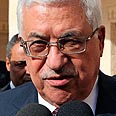
Palestinians to turn to Security Council this week
PA to request condemnation of settlements so as to isolate Israeli government, halt constructions; say negotiations will not resume until freeze resumed
The Palestinians expect to submit their request for a UN Security Council condemnation of Israeli settlements next week and will not be deterred by a US appeal to abandon the idea, senior officials said Monday.
In recent weeks, the Palestinians have prepared a draft that would have the Security Council declare settlements illegal and demand a halt of their construction. During this time, Palestinian diplomats have tried to win support for the proposed resolution.
The appeal to the Security Council is part of a Palestinian strategy to try to isolate and exert pressure on the government of Israeli Prime Minister Benjamin Netanyahu.
US-sponsored Israeli-Palestinian negotiations, launched in September, quickly broke down over Israel's refusal to extend a 10-month moratorium on housing starts in West Bank settlements and include east Jerusalem, both claimed by the Palestinians. They say they will not resume talks unless construction is halted.
Saeb Erekat and Nabil Shaath, two senior aides to Palestinian President Mahmoud Abbas, said Monday that US officials have urged the Palestinians not to seek an anti-settlement resolution from the Security Council. "We told them very clearly that (this) is something we are not going to do," Shaath said. "We are going to the Security Council."
In the United Arab Emirates, UN Chief Ban Ki-moon urged Israel on Monday "to freeze settlement activity anywhere in the occupied Palestinian territories, including in east Jerusalem."
Also Monday, the head of the UN's World Food Program, Josette Sheeran, toured the Palestinian city of Hebron to inspect the distribution of food through electronic vouchers, a program that agency officials say was first tried out in the West Bank.
In the past, needy Palestinians used to pick up their rations at food distribution centers. In 2009, the WFP introduced electronic vouchers, or debit cards, as part of a pilot project, agency officials said.
The vouchers work in urban areas where food is available but those relying on aid can't afford to buy it. In Hebron, the West Bank's largest city, the blue debit cards had the words "bon appetite" written in Arabic on them. Holders can buy staples like lentils, rice, oil and dairy products, at participating stores.
Sheeran visited one shop where 10 beneficiaries were buying supplies.
Ribhi Qawasmeh, 62, said he receives NIS 400 ($113) a month. He said the aid covers only a small part of the needs of his family of 12, but he likes it. "When I enter the supermarket and show the card, it won't look like I'm living on help," he said.
The electronic vouchers have since been introduced elsewhere, including among Iraqi refugees in Syria, the agency said.
In the West Bank, more than 32,000 of some 454,000 beneficiaries now pick up their food rations with the electronic vouchers.
Despite a modest economic recovery in the West Bank, many Palestinians still live in poverty exacerbated by years of political strife and restrictions imposed by Israel.
The UN Relief and Works Agency provides basic services for hundreds of thousands of Palestinian refugees and their descendants, while the WFP helps nearly 770,000 non-refugees in the West Bank and Gaza.
- Follow Ynetnews on Facebook










